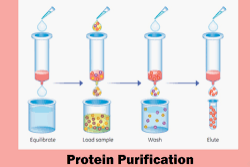PROTEIN PURIFICATION Multiple Choice Questions :-
1. During successful purification scheme, this may be expected that the
A. specific activity increases
B. specific activity decreases
C. number of proteins in the sample decreases
D. both (a) and (c)
Answer: D
2. In ion-exchange chromatography
A. proteins are separated on the basis of their net charge
B. proteins are separated on the basis of their size
C. proteins are separated on the basis of their shape
D. either (b) or (c)
Answer: A
3. Which of the following may be added to stabilize the protein after yeast cells disruption?
A. NaCl
B. Protease inhibitor
C. AMP
D. All of these
Answer: D
4. Gel-filtration chromatography separates on the basis of
A. size and shape using porous beads packed in a column
B. size using porous beads packed in a column
C. shape using porous beads packed in a column
D. none of the above
Answer: A
5. Affinity chromatography deals with the
A. specific binding of a protein constituents for another molecule
B. protein – protein interaction
C. protein – carbohydrate interaction
D. none of the above
Answer: A
PROTEIN PURIFICATION Objective type Questions with Answers
6. A purified protein sample contains 10 µg of protein and has an enzyme activity of 1 m mole of ATP synthesized/sec (1 unit). What is the specific activity of the final purified sample?
A. 1,000 units/mg
B. 10,000 units/mg.
C. 100,000 units/mg
D. 1,000,000 units/mg
Answer: C
7. Proteins separation can be carried out on the basis of
A. net charge
B. solubility in salt solutions
C. size or mass
D. all of these
Answer: D

8. The best way to determine the location of protein in the purification scheme is to measure the
A. rate of ATP synthesis
B. changes in the refractive index
C. UV absorption
D. mass spectroscopy of the protein
Answer: A
![MCQs [2024]](https://engineeringinterviewquestions.com/wp-content/uploads/2021/02/Interview-Questions-2.png)